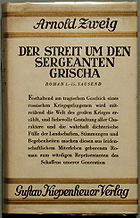
The Case of Sergeant Grischa
Encyclopedia

War novel
A war novel is a novel in which the primary action takes place in a field of armed combat, or in a domestic setting where the characters are preoccupied with the preparations for, or recovery from, war...
by the German
Germany
Germany , officially the Federal Republic of Germany , is a federal parliamentary republic in Europe. The country consists of 16 states while the capital and largest city is Berlin. Germany covers an area of 357,021 km2 and has a largely temperate seasonal climate...
writer Arnold Zweig
Arnold Zweig
Arnold Zweig was a German writer and anti-war activist.He is best known for his World War I tetralogy.-Life and work:Zweig was born in Glogau, Silesia son of a Jewish saddler...
. Its original German title is Der Streit um den Sergeanten Grischa. It is part of Zweig's hexalogy
Hexalogy
A hexalogy is a compound literary or narrative work that is made up of six distinct works, just as a trilogy is made up of three works, and a tetralogy of four. The word apparently first appeared in English as a borrowing from German, in discussions of August Bungert's Wagnerian opera cycle...
Der große Krieg der weißen Männer (The great war of white men). It was part of the so-called "war book boom" of the late 1920s, during which many veterans of the First World War turned their memories and experiences into semi-autobiographical novel
Novel
A novel is a book of long narrative in literary prose. The genre has historical roots both in the fields of the medieval and early modern romance and in the tradition of the novella. The latter supplied the present generic term in the late 18th century....
s. The first English edition was published in 1928.
The first film
The Case of Sergeant Grischa (film)
The Case of Sergeant Grischa is a 1930 American drama film directed by Herbert Brenon, based on the German novel of the same name. The film was nominated for an Academy Award in the category Sound Recording .-Cast:...
based on the novel was created in 1930
1930 in film
-Events:* November 1: The Big Trail featuring a young John Wayne in his first starring role is released in both 35mm, and a very early form of 70mm film and was the first large scale big-budget film of the sound era costing over $2 million. The film was praised for its aesthetic quality and realism...
in the USA, a second one was made in Germany in 1968
1968 in film
The year 1968 in film involved some significant events.-Events:* October 30 - The film The Lion in Winter, starring Katharine Hepburn, debuts.* November 1 - The MPAA's film rating system is introduced.-Top grossing films :- Awards :...
. The East German television
Deutscher Fernsehfunk
Deutscher Fernsehfunk , known from 1972 to 1990 as Fernsehen der DDR , was the state television broadcaster in East Germany.-Foundation:...
aired a mini-series based on the novel at 1970.
Plot
The Russian soldier Grischa escapes from a German prison camp and attempts to return to the family home. After his escape he becomes involved with a group of outlaws, including a young woman, Babka, who dresses as a man and has been prematurely aged by her traumatic experiences. Grischa and Babka become lovers. When he leaves, she gives him the identity tag of a former lover, Bjuscheff, so that if he gets caught he will be mistaken for a deserter and not be sent back to the prison camp. She follows him at a distance in case he ever needs her help.Grischa is eventually captured. Being illiterate, he does not realise that calling himself Bjuscheff worsens his plight, as he has been unable to read the notices saying that all deserters must hand themselves in to the occupying German army within three days or face execution as spies. Only when he is condemned to death does he realise what has happened, and he reveals his true identity. The local German authorities send for his former prison guards, and having confirmed his true identity, they send for advice to Schieffenzahn, the chief administrator on the eastern Front. Schieffenzahn orders that the original error must be ignored, for the sake of discipline. Grischa is therefore sentenced to be shot.
There follows a power struggle between the local military authorities and the administrators. The old general sees it as a point of honour not to give in to Schieffenzahn's order. Although he fails to convince Schieffenzahn face to face, the latter thinks better of it afterwards and rescinds the execution order. However, a heavy snowfall has brought down the communication wires, and the telegram of reprieve is never sent. In the meantime, Babka hatches a plan to poison the prison guards, whilst Lieutenant Winfried, the general's nephew, tries to find alternative ways of getting Grischa out of prison. Both plans fail because Grischa himself is tired of the struggle and refuses to leave, preferring to face execution rather than continue as a pawn in the larger game.
The book is a satire
Satire
Satire is primarily a literary genre or form, although in practice it can also be found in the graphic and performing arts. In satire, vices, follies, abuses, and shortcomings are held up to ridicule, ideally with the intent of shaming individuals, and society itself, into improvement...
, focusing on the way in which innocent men are sacrificed in war, one irony being that the authorities spend more time and energy on the niceties of Grischa's case than they do on trying to save their own soldiers from their fate.

